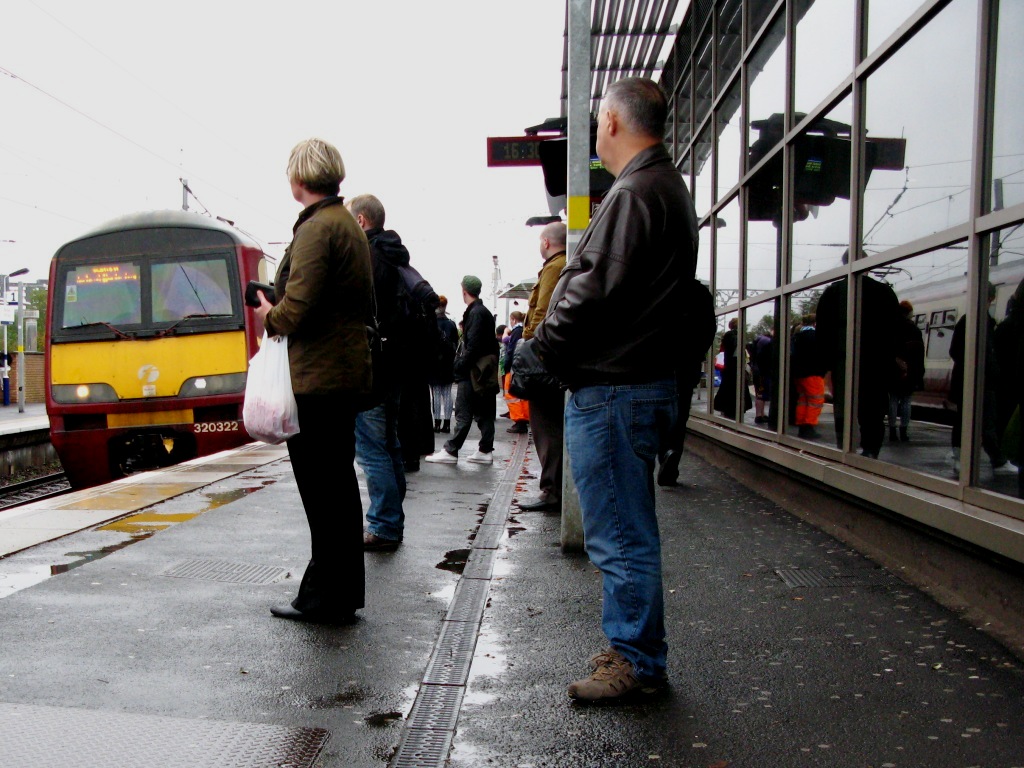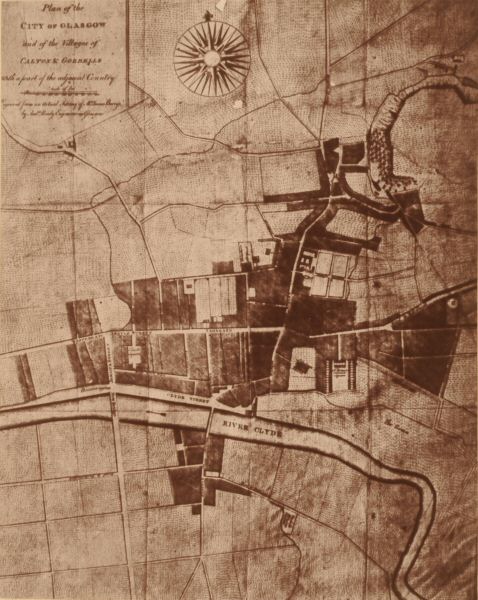|
Merkland Street Subway Station
Merkland Street station was one of the 15 subway stations in Glasgow, Scotland. It is the only station on the system that has closed permanently. The station opened in 1896. It was located to the south-west of its replacement, Partick station and about to the south of Partickhill railway station. It closed permanently in 1977 when the rest of the network was closed for modernisation. The modernisation had been announced in 1974 by the subway's then operators, the Greater Glasgow Passenger Transport Executive (GGPTE). Although converted to electric traction in 1935 the systems infrastructure and rolling stock was virtually unchanged from its opening in 1896, and improvement to the subway was seen by the GGPTE as an essential part of plans to eliminate transport bottlenecks in the city. As part of the process, which began in 1977, all 15 stations were to be rebuilt. However it was planned to link the subway to the national rail network's newly reopened Argyle Line at Partick via ... [...More Info...] [...Related Items...] OR: [Wikipedia] [Google] [Baidu] |
Partick
Partick ( sco, Pairtick, Scottish Gaelic: ''Partaig'') is an area of Glasgow on the north bank of the River Clyde, just across from Govan. To the west lies Whiteinch, to the east Yorkhill and Kelvingrove Park (across the River Kelvin), and to the north Broomhill, Glasgow, Broomhill, Hyndland, Dowanhill, Hillhead, areas which form part of the Glasgow#West End, West End of Glasgow. Partick was a Police burgh from 1852 until 1912 when it was incorporated into the city.Second City of The Empire: 1830s to 1914 from theglasgowstory.com. Retrieved 22 December 2011. Partick is the area of the city most connected with the Scottish Highlands, Highlands, and several Gaelic agencies, such as the Gaelic Books Council (Scottish Gaelic: ''Comhairle nan Leabhraichean'') are located in the area. [...More Info...] [...Related Items...] OR: [Wikipedia] [Google] [Baidu] |
Glasgow
Glasgow ( ; sco, Glesca or ; gd, Glaschu ) is the most populous city in Scotland and the fourth-most populous city in the United Kingdom, as well as being the 27th largest city by population in Europe. In 2020, it had an estimated population of 635,640. Straddling the border between historic Lanarkshire and Renfrewshire, the city now forms the Glasgow City Council area, one of the 32 council areas of Scotland, and is governed by Glasgow City Council. It is situated on the River Clyde in the country's West Central Lowlands. Glasgow has the largest economy in Scotland and the third-highest GDP per capita of any city in the UK. Glasgow's major cultural institutions – the Burrell Collection, Kelvingrove Art Gallery and Museum, the Royal Conservatoire of Scotland, the Royal Scottish National Orchestra, Scottish Ballet and Scottish Opera – enjoy international reputations. The city was the European Capital of Culture in 1990 and is notable for its architecture, cult ... [...More Info...] [...Related Items...] OR: [Wikipedia] [Google] [Baidu] |
Glasgow Subway
The Glasgow Subway is an underground light metro system in Glasgow, Scotland. Opened on 14 December 1896, it is the fourth-oldest underground rail transit system in Europe after the London Underground, Liverpool's Mersey Railway and the Budapest Metro. It is also one of the very few railways in the world with a track running gauge of wide. Originally a cable railway, the subway was later electrified, but the double-track circular line was never expanded. The line was originally known as the Glasgow District Subway, and was later renamed Glasgow Subway Railway. In 1936 it was renamed the Glasgow Underground. Despite this rebranding, many Glaswegians continued to refer to the network as "the Subway". In 2003, the name "Subway" was officially readopted by its operator, the Strathclyde Partnership for Transport (SPT). A £40,000 study examining the feasibility of an expansion into the city's south side was conducted in 2005 while a further commitment from Labour in 2007 to extend to ... [...More Info...] [...Related Items...] OR: [Wikipedia] [Google] [Baidu] |
Scotland
Scotland (, ) is a country that is part of the United Kingdom. Covering the northern third of the island of Great Britain, mainland Scotland has a border with England to the southeast and is otherwise surrounded by the Atlantic Ocean to the north and west, the North Sea to the northeast and east, and the Irish Sea to the south. It also contains more than 790 islands, principally in the archipelagos of the Hebrides and the Northern Isles. Most of the population, including the capital Edinburgh, is concentrated in the Central Belt—the plain between the Scottish Highlands and the Southern Uplands—in the Scottish Lowlands. Scotland is divided into 32 administrative subdivisions or local authorities, known as council areas. Glasgow City is the largest council area in terms of population, with Highland being the largest in terms of area. Limited self-governing power, covering matters such as education, social services and roads and transportation, is devolved from the Scott ... [...More Info...] [...Related Items...] OR: [Wikipedia] [Google] [Baidu] |
Partick Station
, symbol_location = gb , symbol = rail , symbol2 = glasgow , image = Partick station new facade.jpeg , caption = The new façade of ''Partick station'' after a lengthy renovation , borough = Partick, City of Glasgow , country = Scotland , coordinates = , grid_name = Grid reference , grid_position = , manager = ScotRail , platforms = 2 , disabled = , code = PTK , transit_authority = SPT , original = British Railways , opened = Butt (1995), page 181 , mpassengers = , footnotes = Passenger statistics from the Office of Rail and Road Partick station is an interchange station in the Partick area of Glasgow, Scotland. Along with an adjacent bus station, it forms one of the main transport hubs in Glasgow. The station is served by Glasgow Subway and National Rail services an ... [...More Info...] [...Related Items...] OR: [Wikipedia] [Google] [Baidu] |
Partickhill Railway Station
Partickhill railway station was a railway station serving the Partick area of Glasgow. The station was opened by the North British Railway Company in 1874 on the north side of Dumbarton Road. At some periods during its existence it was described as Partick for Govan in some timetables. History It was at one stage, one of three stations in Partick, along with the Central and West stations, but was the only one of the three stations to be spared in the Beeching cuts of the mid-1960s, having been extensively rebuilt in 1958. The station closed in 1979, when the Greater Glasgow Passenger Transport Executive were reopening the Argyle Line (itself a victim of the Beeching axe), they decided to open a new Partick railway station on the same site as Merkland Street subway station, which was itself undergoing refurbishment as part of the overall upgrade of the Glasgow Subway The Glasgow Subway is an underground light metro system in Glasgow, Scotland. Opened on 14 December 1896, it ... [...More Info...] [...Related Items...] OR: [Wikipedia] [Google] [Baidu] |
Strathclyde Partnership For Transport
Strathclyde Partnership for Transport (SPT) is a regional transport partnership for the Strathclyde area of western Scotland. It is responsible for planning and coordinating regional transport, especially the public transport system in the area, including responsibility for operating the Glasgow Subway, the third oldest in the world. History The principal predecessor to SPT was the Greater Glasgow Passenger Transport Executive (GGPTE) set up in 1972 to take over the Glasgow Corporation's public transport functions and to co-ordinate public transport in the Clyde Valley. In the 1980s it was replaced by the Strathclyde Passenger Transport Executive (SPTE), under the overall direction of Strathclyde Regional Council. Section 40 of the Local Government etc. (Scotland) Act 1994 created a new ''statutory corporation'', the Strathclyde Passenger Transport Authority (SPTA), which took over "''all of the functions, staff, property, rights, liabilities and obligations of Strathclyde Re ... [...More Info...] [...Related Items...] OR: [Wikipedia] [Google] [Baidu] |
Argyle Line
The Argyle Line is a suburban railway located in West Central Scotland. The line serves the commercial and shopping districts of Glasgow's central area, and connects towns from West Dunbartonshire to South Lanarkshire. Named for Glasgow's Argyle Street, the line uses the earlier cut-and-cover tunnel running beneath that thoroughfare. The term "Argyle Line" is commonly used to describe: * the extensive urban passenger train service that connects the towns and suburbs of North Clyde with Motherwell, Larkhall, and Lanark, to the southeast. Of the 48 stations, 4 are in West Dunbartonshire, 4 in East Dunbartonshire, 17 in Glasgow City, 10 in North Lanarkshire, and 13 in South Lanarkshire. * the central portion of railway infrastructure encompassing less than . History Prior to 1964 The Glasgow Central Railway (GCR) under central Glasgow opened in 1886, connecting the Lanarkshire and Dunbartonshire Railway at and Stobcross Railway at to the Lanarkshire and Ayrshire Railway near , ... [...More Info...] [...Related Items...] OR: [Wikipedia] [Google] [Baidu] |
World War II
World War II or the Second World War, often abbreviated as WWII or WW2, was a world war that lasted from 1939 to 1945. It involved the vast majority of the world's countries—including all of the great powers—forming two opposing military alliances: the Allies and the Axis powers. World War II was a total war that directly involved more than 100 million personnel from more than 30 countries. The major participants in the war threw their entire economic, industrial, and scientific capabilities behind the war effort, blurring the distinction between civilian and military resources. Aircraft played a major role in the conflict, enabling the strategic bombing of population centres and deploying the only two nuclear weapons ever used in war. World War II was by far the deadliest conflict in human history; it resulted in 70 to 85 million fatalities, mostly among civilians. Tens of millions died due to genocides (including the Holocaust), starvation, ma ... [...More Info...] [...Related Items...] OR: [Wikipedia] [Google] [Baidu] |
Cliff Hanley
Clifford Leonard Clark "Cliff" Hanley (28 October 1922 – 9 August 1999) was a journalist, novelist, playwright and broadcaster from Glasgow in Scotland. Originally from Shettleston in the city's East End, he was educated at Eastbank Academy. During the late 1930s, he was active in the Independent Labour Party. During the Second World War he was a conscientious objector. He also wrote a number of books, including ''Dancing in the Streets'', an account of his early life in Glasgow (in its contemporaneous serialisation in The Evening Times, retitled ''My Gay Glasgow''), ''The Taste of Too Much'', a coming-of-age novel about a secondary schoolboy, and ''The Scots''. During the 1960s and 1970s, he published thrillers under the pen-name Henry Calvin. They were more successful in the US and Canada than in the UK. A collection of his humorous verse in Scots, using the pseudonym 'Ebenezer McIlwham', was published by Gordon Wright Publishing of Edinburgh. He also wrote the words ... [...More Info...] [...Related Items...] OR: [Wikipedia] [Google] [Baidu] |
Glasgow Subway Stations
Glasgow ( ; sco, Glesca or ; gd, Glaschu ) is the most populous city in Scotland and the fourth-most populous city in the United Kingdom, as well as being the 27th largest city by population in Europe. In 2020, it had an estimated population of 635,640. Straddling the border between historic Lanarkshire and Renfrewshire, the city now forms the Glasgow City Council area, one of the 32 council areas of Scotland, and is governed by Glasgow City Council. It is situated on the River Clyde in the country's West Central Lowlands. Glasgow has the largest economy in Scotland and the third-highest GDP per capita of any city in the UK. Glasgow's major cultural institutions – the Burrell Collection, Kelvingrove Art Gallery and Museum, the Royal Conservatoire of Scotland, the Royal Scottish National Orchestra, Scottish Ballet and Scottish Opera – enjoy international reputations. The city was the European Capital of Culture in 1990 and is notable for its architecture, culture, ... [...More Info...] [...Related Items...] OR: [Wikipedia] [Google] [Baidu] |
.jpg)




